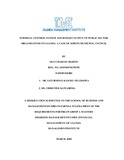| dc.description.abstract | The study investigated internal control system and budget output of public sector organizations in Uganda and Soroti Municipal Council was a case study. The study objectives were; to establish the contribution of control environment on budget output, to find out what effect risk assessment has in achieving desired output of the budget cycle and to ascertain the relationship between control activities and budget output. The stakeholder theory was adopted to guide this study. The target population was 553 people. The target population was stratified; simple random and purposive sampling techniques were used to arrive at the sample of technical staff, political leadership, and other stakeholders (business community, opinion leaders, and citizenry). The study used primary, secondary and tertiary sources for data collection; interview guide was used for face to face interview, key informants’ interview and focused group discussions. A self- administered questionnaire was used to collect data while a check list was used for the observation method. The study attained 78% response rate. Quantitative data was analyzed in a numerical format by the use of a computer program presented in tables. Qualitative data analysis was based on an interpretive philosophy, made a general statement on how categories, groups or themes were related as they existed. The findings of the study revealed that there was a significant positive relationship between internal control systems and budget output; a significant positive relationship between Control environment and budget output, there existed a significant but weak positive relationship between risk assessment and budget output and a significant positive relationship between control activities and budget output. Therefore the study recommended that there was need for the public sector entities to have strong control environment to improve on budget output in revenue collection, to heighten on scale of risk assessment that can lead to increased budget output in resource utilization and good control activities that enhanced budget output through increased quality service delivery. Therefore, Council should conduct regular control system reviews, learn from the outcome and improve on the policies. The correlation analysis confirmed a significant positive relationship between the variables and therefore, a change in internal control system brought in a change in budget output. | en_US |

